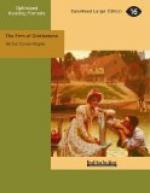“It’s as plain as the fingers of me hand,” the old soldier said in a wheezy muffled brogue, as if he were speaking from under a feather-bed. “See here now, Girdlestone—this is Miss Letitia Snackles of Snackleton, a cousin of old Sir Joseph.” The major tapped his thumb with the silver head of his walking-stick to represent the maiden Snackles. “She marries Crawford, of the Blues—one o’ the Warwickshire Crawfords; that’s him”—here he elevated his stubby forefinger; “and here’s their three children, Jemima, Harold, and John.” Up went three other fingers. “Jemima Crawford grows up, and then Charley Clutterbuck runs away with her. This other thumb o’ mine will stand for that young divil Charley, and then me fingers—”
“Oh, hang your fingers,” Girdlestone exclaimed with emphasis. “It’s very interesting, major, but it would be more intelligible if you wrote it out.”
“And so I shall, me boy!” the major cried enthusiastically, by no means abashed at the sudden interruption. “I’ll draw it up on a bit o’ foolscap paper. Let’s see; Fenchurch Street, eh? Address to the offices, of course. Though, for that matter, ‘Girdlestone, London,’ would foind you. I was spakin’ of ye to Sir Musgrave Moore, of the Rifles, the other day, and he knew you at once. ‘Girdlestone?’ says he. ‘The same,’ says I. ‘A merchant prince?’ says he. ‘The same,’ says I. ‘I’d be proud to meet him,’ says he. ‘And you shall,’ says I. He’s the best blood of county Waterford.”
“More blood than money, I suppose,” the young man said, smoothing out his crisp black moustache.
“Bedad, you’ve about hit it there. He went to California, and came back with five and twinty thousand pounds. I met him in Liverpool the day he arrived. ‘This is no good to me, Toby,’ says he. ‘Why not?’ I asks. ‘Not enough,’ says he; ‘just enough to unsettle me.’ ‘What then?’ says I. ‘Put it on the favourite for the St. Leger,’ says he. And he did too, every pinny of it, and the horse was beat on the post by a short head. He dropped the lot in one day. A fact, sir, ’pon me honour! Came to me next day. ‘Nothing left!’ says he. ‘Nothing?’ says I. ‘Only one thing,’ says he. ‘Suicide?’ says I. ‘Marriage,’ says he. Within a month he was married to the second Miss Shuttleworth, who had five thou. in her own right, and five more when Lord Dungeness turns up his toes.”
“Indeed?” said his companion languidly.
“Fact, ’pon me honour! By the way—ah, here comes Lord Henry Richardson. How d’ye do, Richardson, how d’ye do? Ged, I remember Richardson when he was a tow-headed boy at Clongowes, and I used to lam him with a bootjack for his cheek. Ah, yes; I was going to say—it seems a demned awkward incident—ha! ha!—ridiculous, but annoying, you know. The fact is, me boy, coming away in a hurry from me little place, I left me purse on the drawers in the bedroom, and here’s Jorrocks up in the billiard-room afther challenging




